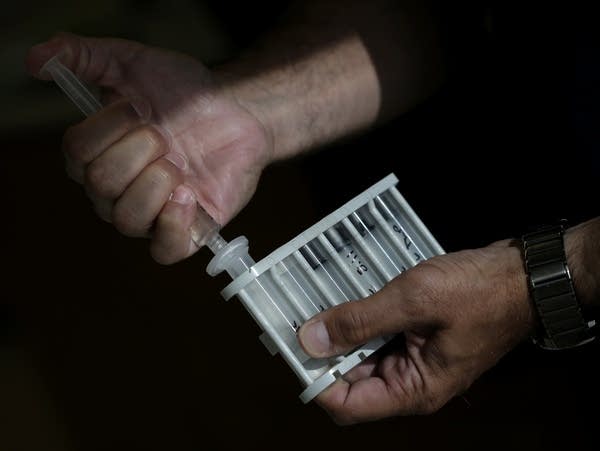Should farmers or city pay to clean the water? Iowa may decide

Go Deeper.
Create an account or log in to save stories.
Like this?
Thanks for liking this story! We have added it to a list of your favorite stories.
The water gushing from a big galvanized pipe in this rural patch of northwest Iowa is filled with runoff from area farms. No one here would think to drink it.
Some 200 miles downstream, however, Des Moines officials say that same potentially toxic farm drainage flows toward their city and its citizens. Des Moines filters it, but city leaders say it's become increasingly costly to keep farm field nitrate out of the urban water system and that their customers shouldn't have to pay to hold back that pollution.
The Des Moines Water Works is now suing 10 rural Iowa drainage districts, arguing that farm runoff should fall under federal codes regulating water quality and human health. If that happens, it could shift the costs of filtering farm effluent directly onto rural Iowa and its farmers. A trial is set for June 2017.

Iowa farmers say the added expense could ruin them. But the suit could bring historic change to water regulation and farm economics across the country, including Minnesota.
Turn Up Your Support
MPR News helps you turn down the noise and build shared understanding. Turn up your support for this public resource and keep trusted journalism accessible to all.
"We want regulation on those pipes and what comes out of the pipes," said Bill Stowe, CEO of the Des Moines Water Works, two hours south of the gushing pipe in Sac County. "We think that's the only way to get our hands around what we see as a growing threat to public safety and public health by contaminants in the surface waters of this state."
Nitrate occurs naturally but is also a byproduct of nitrogen fertilizer, which farmers spread on fields by the ton. Nitrate moves from farm fields into both ground and surface drinking water sources.

Consuming excessive nitrate degrades the blood's ability to carry oxygen. Too much infant formula contaminated with nitrate can kill a baby, according to the Minnesota Department of Health.
Two years ago, after a heavy rain, the nitrate levels from the Sac County drainage pipe spiked from harmless to four times the maximum safe level for drinking water.
"It's a public health business, obviously. You're intaking a commodity that has serious impacts upon public health. Flint has reminded us of that with a different issue but the same general concern," Stowe said, noting the turmoil triggered recently by the discovery of toxic levels of lead in the drinking water of Flint, Mich.
Des Moines Water Works had to run its expensive nitrate removal equipment for 177 days last year. It was installed in the 1990s. The Des Moines utility spent $1.5 million last year to remove nitrate that made their way to the municipal water system's intake. It says it needs tens of millions of dollars in upgrades to keep up with the growing nitrate problem. Ratepayers just saw their bills hike 10 percent.

Farmers who cause the problems should have to pay the costs, said Stowe, not his customers. The utility argues pipes discharging tile drainage are point-sources of pollution, which would make the drainage subject to federal requirements aimed at preventing harm to water quality and human health.
If the Des Moines Water Works prevails, it could be the first time farmers have been held liable for pollution coming off their fields.
Lawyers for the drainage districts, however, say that farm runoff from hundreds of miles away is not the sole source of the high nitrate levels that show up on Des Moines' doorstep.
"Those 10 drainage districts' contribution to the nitrate levels in Des Moines where the water is drawn by the Des Moines Water Works is 4 tenths of 1 percent. Virtually nothing," said Gary Armstrong an attorney from Storm Lake, Iowa.
Still, the threat of subjecting farm runoff to regulation under the Clean Water Act has galvanized ag groups in an all-out effort to combat the lawsuit. As of last month, private donors paid $934,000 of the $1.1 million defense legal tab. Organizations including the Farm Bureau and the Iowa Corn Growers Association have donated hundreds of thousands of dollars to the defense.

Many individual farmers chafe at the accusations in the lawsuit.
"We consider ourselves environmentalists of a sort. Not necessarily tree huggers, but we think you gotta take care of the land," said Marc Bertness, who farms in Iowa's Buena Vista County, one of the three counties with drainage districts named in the lawsuit.
Bertness said he regularly monitors his water quality and uses techniques to clean the water that leaves his fields. A regulated system, he added, would hurt farming's bottom line.
"Maybe we get a surcharge of $2 an acre on our taxes, or $5 an acre per year for 20 years," Bertness said. "The point is that it will ultimately come out of the pocket of the landowners and eventually out of pocket of the tenants."
That could spell economic ruin with grain prices below break-even for most farmers right now, he added.

Many farm groups oppose regulation and argue the way to clean up Iowa's waterways is to be encouraging farmers to plant cover crops or buffer strips — methods to keep more of the nutrients in place and not escaping through the intricate tile system.
Part of the problem is that tile drainage that channels the runoff is also a big part of Iowa's farming success. Draining water from farm fields was so important to food production, the federal government subsidized the practice for decades. Tile drainage makes farming possible in much of the Midwest. Without it much of the region's farm fields would be saturated swamp land.
"Do we really want to turn northwest Iowa into swamp again?" asked Sac City lawyer Colin McCullough, one of the local attorneys representing the ten drainage districts.
Farmers have "largely been exempt" from the federal Clean Water Act and it could spell trouble for farm country if suddenly the underground drainage systems are regulated, said Mark Ryan, an attorney and expert on the Clean Water Act who represented the federal Environmental Protection Agency for more than two decades.
"These tile drains in the Midwest play a very important role in farming and agriculture in keeping the ground dry," he said. "If they suddenly had to treat them, I think it would probably in much of Iowa be uneconomical to farm."
Ryan says he expects the case to work through the courts for years and possibly reach the Supreme Court.

Stowe, the head of Des Moines Water Works, seems ready for a long fight, although he said he'd be willing to settle if terms would lead to less farm runoff pollution. So far, though, he said farmers and farm groups are mostly pushing back.
"The idea that we are going to somehow to make huge swaths of Iowa un-farmable is, I think, a sky is falling kind of response," he added.
Some farmers actually welcome the Des Moines Water Works lawsuit — even those who couldn't farm without tiling to drain water from their land.
"People used to come out here in the olden days and hunt ducks, I mean this was a slough area," said Lee Tesdell, a landowner in central Iowa's Polk County who works to clean the water that leaves his fields.
He sees the Des Moines Water Works Lawsuit as a positive thing.
"It's waking everybody up to what we need to do," he said. "It sounds a little adversarial, but how do you get important things to happen? Sometimes you have to be a little aggressive."
Correction (May 18, 2016): An earlier version of this story misidentified the location of Lee Tesdell's farm. It is located in Polk County, Iowa. The story has been updated.


